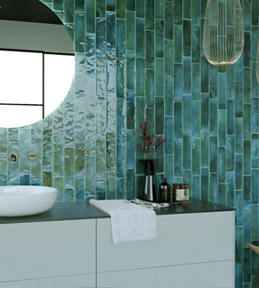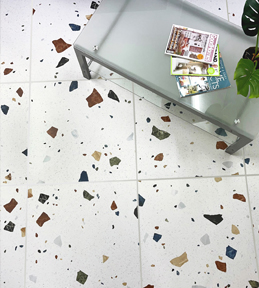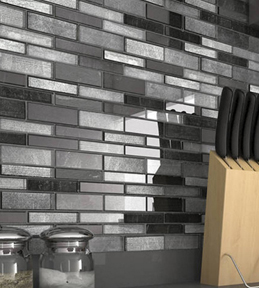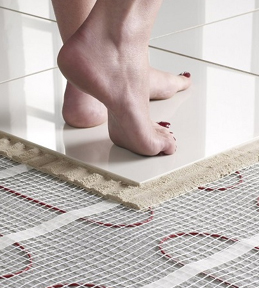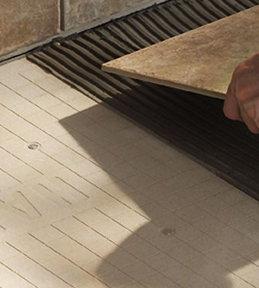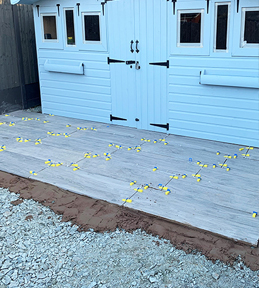Frequently Asked Questions

Any questions you may have regarding tiles - F.A.Q
Why should I use sealants on Natural Stone Tiles?
Sealing your stone is a must. Based upon your lifestyle and the type of stone you choose, the appropriate stone sealer will protect your floor from staining. Stone does not have a fired surface like ceramic and porcelain tile which do not need to be sealed (except polished porcelain). When advising our customers which sealants are appropriate to use on natural products we advise to use Stain Stop before tiling, and seal guard once the tiles have been fixed on either the wall or floor giving the tiles and grout more protection.
Does white grout discolor easy on the floor?
Depending where you are planning to use the white grout, its not advisable for it to go on the floors where there will be a lot of traffic, or where it may be leading in from the garden, because it will get dirty very quickly, you can use all types of sealants and cleaners but it will never stay clean.
Can you use wall tiles on the floor?
No, they are not strong enough to be walked on, they are generally not thick enough and the glaze is different, and not suitable for the floor. Keep an eye out whether the tiles which are on the wall are porcelain or ceramic, because you can use porcelain wall tiles on the floor as they are strong enough, its just ceramic tiles you need to be wary of.
What’s the difference between ceramic tiles and a porcelain tiles?
Typical uses for ceramic tile are showers, backsplashes, bathroom and kitchen walls and floors. Requiring a stronger material than ceramic, porcelain tile is developed by composing finer bisques, finishes and firing methods.
Can I tile over old tiles, or should I remove them?
Yes you can fix tiles over existing tiling, but first you need to check that the existing tiling is firmly bonded to the background, then clean and degrease the tiles. In order to get the best possible results you will have to rough the surface of the tile possibly using a piece of sand paper, once you have disregarded the dust off the tile then proceed to cover the tiles using PVA so that the tiles will have that extra bond with the existing tiles. We recommend that if you are tiling over tile on the wall use multifix and flexible rapid set for the floor.
How easy is it to fit Mosaic Tiles
Mosaics tiles aren’t the easiest of tiles to fit on the wall or the floor. Before attempting to tile them please refer to the following link;
http://tilechoice.uk/mosaics.php
What are porcelain tiles?
Porcelain Tiles are known for their durability and zero-maintenance qualities which make them a favorite for use in areas that are exposed to heavy wear and tear. Especially when there is an opportunity to use a heavy duty material without having to compromise on aesthetic appeal.
Can I use Porcelain or ceramic Tiles outside
Unfortunately not, ceramic tiles are only designed to be used indoors due to the tiles not being frost proof. On the other hand you can use porcelain tiles as they have the right ingredients to with stand the frost. If you are laying porcelain tiles outside you will need to use acrylic primer on the floor before hand, once that has dried (leave for about minimum of 12 hours), use flexible rapid (never use ready mix adhesive, always use powdered)
How to measure for your tiles?
If you click on to the following link it will take you to the relevant information
http://tilechoice.uk/measure.php
Do Polished Porcelain Tiles need sealing?
Polished porcelain needs to be sealed with a good impregnator sealer, lay the tiles give the full floor a good coat of impregnator sealer then grout, reason you seal polished porcelain is that the polishing process open millions of tiny holes in the tiles surface and dirt and grime can get into them and cause dulling. Matt porcelain tiles need sealing too.
Why are porcelain tiles more expensive than ceramic tiles?
Because you are getting a superior product. Porcelain tile requires the finest natural ingredients and a rigidly controlled manufacturing process that utilizes the most advanced processes and technology.




